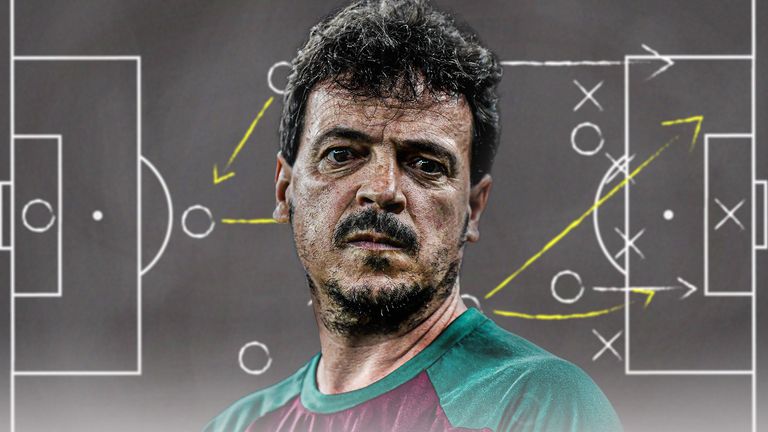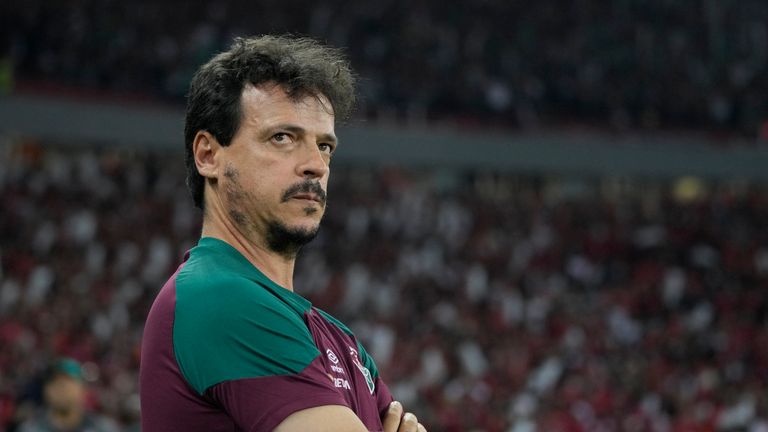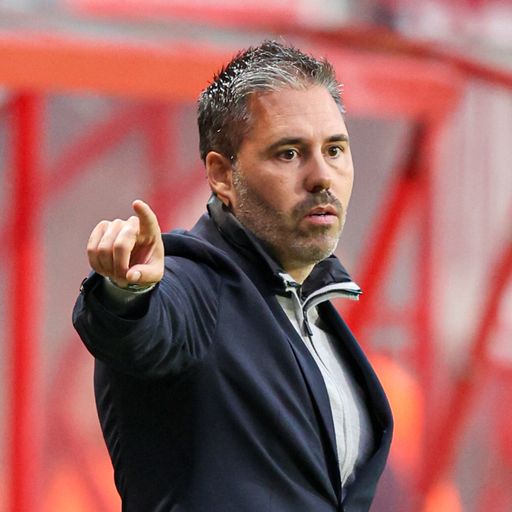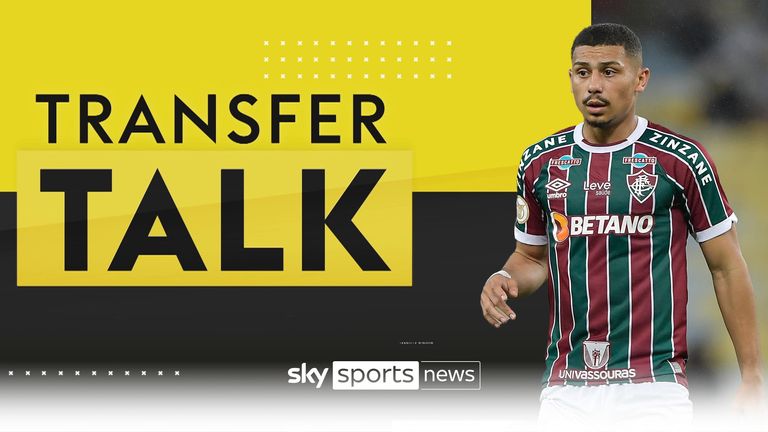Fernando Diniz’s innovative tactics with Fluminense: Can he win the Copa Libertadores and change football too?
Brazil boss Fernando Diniz is on the brink of winning the Copa Libertadores with Fluminense. He has done so playing an innovative possession game that is styled as the opposite of Pep Guardiola. Adam Bate speaks to those in the know to find out more…
Wednesday 1 November 2023 18:24, UK
The Copa Libertadores final pits Fluminense against Boca Juniors in the Maracana on Saturday. It is a huge moment for Flu, the Brazilian giants who are trying to win the competition for the first time. But the game has wider significance because of their team’s tactics.
The football of Fernando Diniz has become a fascination. It is possessional play reimagined. The opposite of Pep Guardiola, according to Diniz himself. To some, it is new. To others, it is the restoration of jogo bonito, the beautiful game.
Brazil as it would like to see itself.
Leaning on ideas from futsal, this is football as free expression with players no longer shackled to a zone but encouraged to interact, rotate and create. "The way Pep likes having possession is the opposite of mine. His style is positional, mine is anti-positional."
To European eyes, these overloads, these lopsided formations, they challenge established wisdom. Carlos Carvalhal, the experienced Portuguese coach, calls it "a kind of chaos" - contorting his face in such a way that suggests both wonder and bemusement.
For Bruno Pivetti, who once served as Diniz's technical assistant, the contrast between the European game and the ideas of Diniz, the so-called Dinizismo being explored at Fluminense and now in his role as caretaker manager of Brazil, could hardly be more pronounced.
Pivetti worked in Europe as a young coach, studying the positional game in Portugal. "That is the European culture of football. What we are taught by that European school is that positional play is the best way because it gives you width and depth," he tells Sky Sports.
"All the players stay in their position and that means that when a player loses possession it is easier to be organised defensively because all the players are already located in their position. It makes it easier to press, easier to drop back into a defensive shape."
His two-and-a-half years with Diniz at Audax, listening and learning, changed how he saw the game. "When I started to work with Fernando, a lot of these paradigms broke down," says Pivetti. "I realised that there are a thousand ways to play football."
Pivetti is keen to stress that there is more to Diniz's management than tactics. "He graduated in psychology. He is very clever. He has a particular way of managing and motivating players. It is very interesting." But it is the Diniz game model that makes him unique.
"It is very particular. From the first phase of the build-up, he wants this very intensive rotation of his players. He tries to get the most technical players involved in that first phase to help the goalkeeper keep the ball and then progress up the field from there.
"The full-backs come inside and play between the lines and this causes confusion for the opposition in terms of how they defend. It creates a dilemma for them. They do not know if they should press or stay to protect the zone because all the players are rotating.
"The wingers do not always stay wide. They come inside. All the players play together so the player on the ball always has three or four passing options close by. It is very difficult to defend against Diniz's idea because there are so many offensive options."
When Pivetti talks of possession, he says: "His basic principle is to keep the ball." When he refers to pressing, he adds: "The players react fast to put pressure on the ball. It is very aggressive and when he regains the ball, all the players are close together."
In these moments, to the uninitiated, those of us outside coaching circles, these just seem like variations on a theme. The similarities to the approach now popularised in the Premier League are obvious. But inside the game, they recognise profound differences too.
It has sparked a debate about the merits of positionism and this so-called relationism. A discussion that is taking place in Brazil's national academy. "We get together as coaches to speak about his ideas. A lot of coaches want to understand the way of Fernando."
And that has now spread beyond South America.
Rene Maric has long been at the vanguard of tactics, blogging on the subject before finding success as a coach with Borussia Dortmund. "There is this discussion about relationism versus positionism but for me these words are not important," Maric tells Sky Sports.
What matters is the idea. The similarities and the differences.
"The focus is on having the ball and make something happen in possession just like Robert De Zerbi and Pep Guardiola. But with Fluminense, where you have these extreme overloads, they want to keep the ball but they are less focused on the spatial aspect."
Imagine Jack Grealish drifting inside to play closer to Phil Foden. For Guardiola, this would just congest the space. Precisely what he does not want to happen. For Diniz, this would create an overload, increasing the likelihood of a give-and-go to unlock the defence.
Maric points to the role of Paulo Henrique Ganso at Fluminense. An elegant playmaker, now 34, his time in Europe was only brief but he has been pivotal for Diniz, moving deep to collect the ball. "It is not like Ganso is aimlessly making combinations," Maric explains.
"He is allowed to roam but he is still following similar principles to De Zerbi's centre-backs. He is keeping the ball, luring them out, attracting them, creating space. But instead of doing it all over the pitch with a good distribution, they do it in one part of the pitch."
It demands a lot of Diniz's players because it is "more about timing than space" as rondos and tabelas, a constant whirl of one-twos, are required to move the team up the pitch. But when it works, as it has so spectacularly with Fluminense, it can be beautiful.
Maric recognises similar patterns in the work of Rhulani Mokwena at South African club Mamelodi Sundowns and Henrik Rydstrom at Swedish side Malmo. Marti Cifuentes has faced the football of the latter up close as head coach of Hammarby in Sweden.
Like Maric, Cifuentes is reluctant to put a label on this style on the basis that nothing in football is truly new. But he recognises it. "It is true that there is a certain trend with this relationism and Malmo are following some of those principles," he tells Sky Sports.
Cifuentes is diplomatic. He highlights the principles that he agrees with. "I think relationism has some things that are in common with the positional way of playing, which is to create good relations with the players. It is about creating superiorities to help you score."
But as a Catalonian coach in Europe, his own inspirations inform his take on the game. "In my opinion, the ball will always be faster than any player," he explains. "That is why I think having good positioning on the pitch will always allow you to play faster."
What impact does the opinion of the new QPR coach have on Diniz? None, directly. But it is instructive of the thinking across Europe among disciples of Guardiola's approach. That matters when it is the prevailing view among the men who coach Brazil's best players.
Diniz, now 49, has endured a difficult start to life with the national team. A disappointing draw at home to Venezuela in October was followed by a defeat to Uruguay. Argentina await at a time when the European-based players are struggling to adapt to his demands.
In one respect, it should be easier for Diniz to make it work now that he has reached the top. It is a far cry from his time in the second division of the Sao Paulo state competition alongside Pivetti a decade ago. "He is working with the best players now," says Pivetti.
"His ideas are very similar to what they were then but now he is at the top and has the quality to put his ideas into practice. At that time, we were playing on very bad pitches, for example. Now, he has much better conditions to implement his ideas."
On the other hand, his style of play demands more imagination from players. It takes time for relationships to develop. Time that he does not have. "With the national team he only has a few days to prepare the team, just a few training sessions," adds Pivetti.
As a result, Diniz was left bemoaning after the defeat to Uruguay that "the team did not know how to build and the main responsibility is mine." He remains convinced that his methods can work but he is still fighting against the dominant football culture.
And not just in Europe. The success of Jorge Jesus in winning the Copa Libertadores with Flamengo in 2019 sparked a rush to appoint Portuguese coaches to the biggest jobs in Brazil. In this context, the rise of Diniz can be seen as an attempt to push back.
Abel Ferreira, the Portuguese coach in charge at Palmeiras, has suggested that he himself is fighting against the Brazilian instinct in trying to implement a positional game there. It is a view shared by Pivetti, that Dinizismo is a more natural way for Brazilians to play.
"The players here come from another culture of football so I don't think it is so difficult for Brazilians to adapt to his way of playing because it is similar to what we did in our childhood on the streets of Brazil. I think the essence of Fernando's idea is this street football.
"The players there do not have a fixed position and they rotate all the time. It is very similar in futsal, which plays a big part in the formative years here. You need to press aggressively and rotate. Fernando tries to put these futsal skills into his game idea."
Doing so with Brazil on the international stage would be the ultimate achievement, rekindling the spirit of 1970, showing that the glorious football from 1982 can still work. But winning the Copa Libertadores with Fluminense? That would be a marker too.
It could spark a renaissance for relationism, a different way of seeing the game, a turning point for Brazilian coaching. "Here, coaches are just working to survive," says Pivetti. "But Fernando had the courage to try his ideas. I hope he wins the title." He is not alone.










